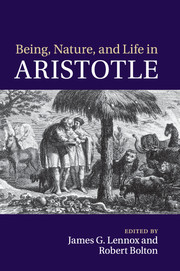Book contents
- Frontmatter
- Contents
- Preface
- Notes on contributors
- Acknowledgments
- Allan Gotthelf: a biographical sketch
- Note on abbreviations
- Introduction
- 1 Teleology, Aristotelian and Platonic
- 2 Biology and metaphysics in Aristotle
- 3 The unity and purpose of On the Parts of Animals 1
- 4 An Aristotelian puzzle about definition: Metaphysics Ζ.12
- 5 Unity of definition in Metaphysics Η.6 and Ζ.12
- 6 Definition in Aristotle's Posterior Analytics
- 7 Male and female in Aristotle's Generation of Animals
- 8 Metaphysics Θ.7 and 8: Some issues concerning actuality and potentiality
- 9 Where is the activity?
- 10 Political community and the highest good
- Allan Gotthelf's contributions to classical philosophy
- References
- Index locorum
- General index
1 - Teleology, Aristotelian and Platonic
Published online by Cambridge University Press: 06 December 2010
- Frontmatter
- Contents
- Preface
- Notes on contributors
- Acknowledgments
- Allan Gotthelf: a biographical sketch
- Note on abbreviations
- Introduction
- 1 Teleology, Aristotelian and Platonic
- 2 Biology and metaphysics in Aristotle
- 3 The unity and purpose of On the Parts of Animals 1
- 4 An Aristotelian puzzle about definition: Metaphysics Ζ.12
- 5 Unity of definition in Metaphysics Η.6 and Ζ.12
- 6 Definition in Aristotle's Posterior Analytics
- 7 Male and female in Aristotle's Generation of Animals
- 8 Metaphysics Θ.7 and 8: Some issues concerning actuality and potentiality
- 9 Where is the activity?
- 10 Political community and the highest good
- Allan Gotthelf's contributions to classical philosophy
- References
- Index locorum
- General index
Summary
GOD AS PARADIGM
Aristotle was Plato's student for two decades before founding his own school. Is it more fruitful to think of his mature work as anti-Platonist, or as that of an independent Platonist? Although this age-old question does not admit of final resolution, I am convinced with regard to my present topic, the explanation of purposive structures in the world, that most can be learnt by emphasizing, rather than minimizing, Aristotle's Platonic background and training.
Plato, like nearly every other thinker in and well after antiquity, associated teleology with conscious purpose. To make the world a purposive structure just is to posit an intelligent mind as its cause. True, the intelligent mind could have created the world and then left it to run itself mechanically, but no ancient thinker – after at any rate Anaxagoras, whose position on the point is open to dispute – was ready to contemplate a split-level theory of that kind. Either the world was intelligently created and is intelligently run, or it originated from non-intelligent causes and is still, with the possible exception of human action, governed by causes of that same kind. While the atomists defended the latter view, Plato developed the former: his Demiurge, who created the world, has left it under the overall control of the intelligent and divine world-soul.
In conformity to this background, Aristotle too treats the twin issues of creation and administration in strict parallel to each other.
- Type
- Chapter
- Information
- Being, Nature, and Life in AristotleEssays in Honor of Allan Gotthelf, pp. 5 - 29Publisher: Cambridge University PressPrint publication year: 2010
- 17
- Cited by

